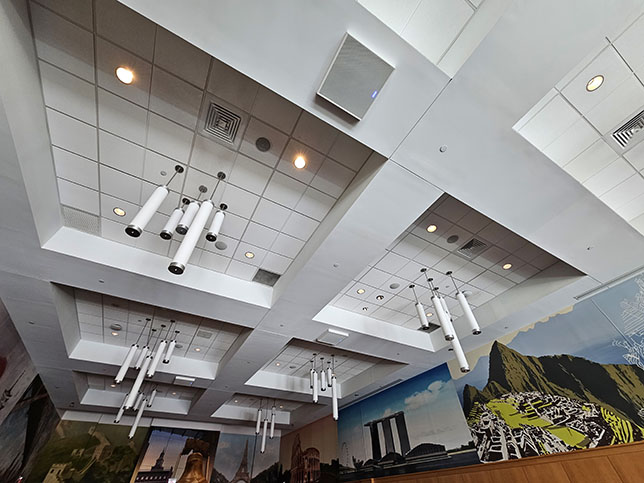Temple University Hybrid Learning Technology
The Fox School of Business at Temple University in Philadelphia, Penn., recently adopted solutions from ClearOne—namely, the BMA 360 Microphone, and CONVERGE® Pro 2 DSP Mixer—to provide educators with easy-to-use classroom systems that improve remote learner experiences and usability. According to the school’s IT Director, Vikram Singh, the tumultuous COVID years created an urgent need for modern remote communication tools that provide convenience, reliability, and room-to-room consistency, and most importantly, deliver crystal clear audio quality for every remote participant.
“By 2021, we had demoed a variety of solutions with our partner installation firms. We decided that the ClearOne BMA 360 and CONVERGEPro 2 solutions offered the most user-friendly and flexible system that could be adapted into a range of room types and sizes,” Singh explained. “The first room we addressed was an event space of around 3,000 square feet with 20-foot ceilings, which previously relied on wireless handheld and lavalier microphones for voice pickup. Adding three BMA 360 ceiling tile microphones throughout the room greatly simplified use and increased efficiency because it can pick up voice accurately and clearly from any spot in the room, eliminating the need to hand-deliver microphones for audience questions.”

ClearOne’s BMA 360 ceiling tile microphones increase simplicity and efficiency in large event spaces and classrooms at Temple University.
Photo Courtesy of ClearOne
As a proof of concept, the event space was a major success. Combined with the room’s two cameras and two laser projection screens, the BMA 360 (Beamforming Microphone Array) audio solution delivered superior audio quality and reliability with no daily setup required. Instructors and meeting hosts praised the system’s simplicity, including its ability to work with various collaboration platforms such as Zoom and Microsoft Teams, as well as its compatibility with all major operating systems, including Windows and MacOS.
Following the initial success, the school began outfitting additional large spaces with the same three-BMA 360 solution, including the adjacent large classroom and an auditorium. Key benefits of the BMA 360 include its 600-square-foot pickup range and ability to automatically steer the microphone arrays to the current speaker. These features enable the three-microphone system to capture audio from every spot, with greater clarity than previous designs that relied on microphones with smaller coverage.
“After a brief pause of all in-person activities, we invited instructors to host hybrid lessons where some students may show up in person, and others could attend online,” Singh added. “It was obvious that the ClearOne room was the ideal solution, as other spaces experienced major disruptions in audio pickup due to existing microphones picking up HVAC noise. The advanced noise cancellation offered by the BMA 360 and CONVERGE Pro 2 digital signal processor solved that problem and became our preferred solution, which we are now in the process of standardizing across the school. In fact, it’s so intuitive to use that we don’t even have to provide training - the users just know how it works.”
“Replacing the existing hanging mics in the Fox School of Business with ClearOne’s nearly invisible ceiling tile microphones has improved the appearance of these rooms, with reduced distractions and visual clutter,” said Jason DiCampello, CTS Regional Sales Director at ClearOne. “Additionally, after each room is installed and programmed, there are no complicated settings to fiddle with or options to choose, so staff can focus on the lesson and the students instead of wasting time fussing with the technology.”
The success quickly spread beyond the Fox School of Business, with several other Temple University schools beginning renovations of remote collaboration systems with the same ClearOne solution. Instructors and meeting hosts can use each room’s integrated PC or easily connect their own laptops, regardless of operating system or collaboration platform.
Standardizing on ClearOne is an important goal for Singh, as it simplifies every aspect of daily use, including instructor and student experiences, system maintenance and room scheduling. With 40 classrooms, five event spaces and about 25 conference rooms, deploying minor variations on a standard solution can help minimize in-class setup time and avoid the frustration and delays that often arise from using disparate systems. As smaller rooms may not require multiple BMA 360s or their own CONVERGE Pro 2 DSPs, they can instead utilize other ClearOne devices specially designed for smaller spaces.
Temple’s hybrid and remote solution upgrades are ongoing and will continue in coming years as budgets allow, with an ultimate goal of a fully standardized campus where every relevant room functions the same. The CONVERGE Pro 2 DSP provides enhanced signal processing to improve audio clarity even further, as well as manage input signals from multiple microphone units.